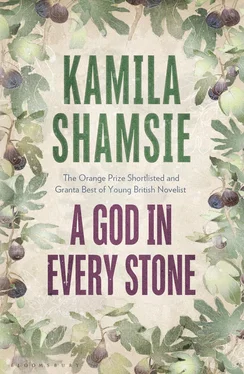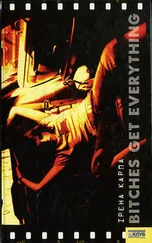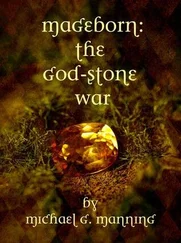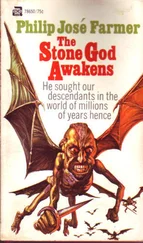The youngest of his sisters burst into tears, and stepped forward, one hand hovering over the shrapnel scars around his eyes. Qayyum caught the tips of her fingers and brought them to rest on her jutting belly. A boy, he said, and she replied, A soldier. Qayyum shook his head, looked away — how small this space was, how gloomy, with narrow bars of light falling slantwise from the window slats onto the English-style dining table which he’d insisted on buying during his last leave, its bulk dominating the room, books at one end of it, kitchen implements at the other. His mother held a Qur’an as high as her arms would allow; Qayyum ducked beneath it, his mother whispered a prayer, and he was home.
— A man wears scars as a woman wears bangles.
His mother held up her thick wrists, jangled both of them. She was perhaps thirty-seven or thirty-eight, and if she were English that wouldn’t make her old. But she looked the same age as her husband, twenty years her senior, who remained trim and spritely though his cheeks had the concavity which came from missing teeth. He cleared his throat; a letter-writer who spent his life transcribing other people’s words, he had so few of his own.
— Najeeb went to meet you at the train station, his father said.
— I didn’t see him.
The mention of sight made the old man wilt; he looked at his wife, nodding his head as if she had already said the next thing and he wanted to make it clear he agreed.
— You’ll receive a pension, won’t you? For the rest of your life?
— Yes, Amma.
— At least some good has come of this. When I start looking for a bride I can say, how many two-eyed men have a guaranteed income for their entire lives?
The middle sister giggled, and started to hum a wedding song. Behind her mother’s back she pulled a face and crossed her eyes to let him know that the most beautiful girls in the Walled City were being saved for whole men. There wasn’t enough air in this room to fill a man’s lungs. He felt someone tapping his back, gently, and there was Najeeb, looking straight at Qayyum’s face with an expression that didn’t pretend everything was all right.
— Does it hurt?
He clasped the boy’s head to his chest, and exhaled.
Qayyum sat on a bed strung with rope, bending forward towards the lantern on the ground. He lifted the glass chimney, lit a match, adjusted the flame, drawing the smell of kerosene into his nostrils. These tiny, automated rituals had become a comfort. Only when the glass was secured in place, and his body pulled into a cross-legged position allowing no proximity between his feet and the lantern, did he extract the handkerchief from his pocket. Cupping his palm he placed the weight at the centre of the handkerchief carefully within it, and unbraided the cloth with one hand. The silk draped over his palm. He pulled away the covering of cotton wool and, in the light of the full moon and the lantern, an eye stared glassily up at him.
It was the most amazing thing he had ever seen. He touched it gently with his thumb. The brown of the iris almost the same shade as the remaining eye, tiny capillaries painted onto the whites of it. Once the infection subsided, the doctor on the ship to Karachi had assured him, he would be able to wear it again. And the cluster of shrapnel scars would fade. You’ll be breaking hearts again in no time. He understood now that the nurse had meant it as kindness, not an accusation.
He walked over to the matting which formed a barrier around the roof. Standing on the balls of his feet he was able to see over the matting, down to the street below and the buildings all around. Mud-and-brick houses and once brightly painted windows and doors all equally the colour of night. The construction haphazard so the upper storeys of buildings looked as if they might tumble off at any moment. Here and there, a faint lamp-glow from rooftops. Sleeping camels in the caravanserai, a boy curled against the flanks of one of the foul-smelling beasts. Did you need to learn how to slaughter in ways that were unimaginable to a Pashtun to make your country a place where every child was well fed, every home prosperous, everything a fine city or abundant farmland?
— Lala?
He tried to pretend he hadn’t heard, hoping Najeeb would go away.
— Lala, they’ve all gone to sleep. I brought you some dinner. I’ll leave it here.
The sound of a plate being set down, and the scent of something wonderful. A homecoming meal from which he’d shut himself away.
— No, stay.
Najeeb sat at the very edge of the bed-frame, watching his brother eat. He had been the only one in the family who had met Qayyum’s silence with silence instead of an increasing pitch. Even their father had tried to join in the chatter, multiplying its discordance.
— Hold out your hands. Be careful now.
Qayyum placed the handkerchief in his brother’s hands. Najeeb lowered his face and brushed it against the silk.
— What is that smell?
— An Englishwoman.
Najeeb’s mouth opened wide and Qayyum laughed. The first laugh in a very long time.
— She was older than our mother, and had a mouth which looked as if it had been eating lemons all her life. But she was very kind. Open it, look inside. Carefully, carefully.
Najeeb unwrapped the handkerchief as if it were a present. If he was surprised to see an eye staring at him, he didn’t show it. Closing his palms protectively around it he lowered himself onto the ground, resting on his elbows, his hands as close to the lantern as was safe. For a long time he simply looked at the glass eye, rotating it slightly this way and that so he could inspect every part of its surface. In this way he could stare at a book, a butterfly wing, a rock. A stillness at the heart of his character. There were some boys in the 40th Qayyum had felt particularly protective towards; now he understood he had seen the shadow of his brother in them.
At length, Najeeb stood up, the same height as the seated figure of his brother.
— What’s in there now?
— Look.
Qayyum held his thumb and forefinger like a pair of crab claws around his eye, pulling at the skin to force the eyelid open. He saw Najeeb’s fingers extend towards him, found he didn’t have to fight against any desire to back away. How strange — not troubling, just strange — to feel his brother’s touch against the bone of the eye-socket.
But no; he had imagined it. Najeeb placed his hand over his brother’s thumb and forefinger, and simply bent down and peered into the socket which was more than Qayyum could bring himself to do in front of the mirror.
— It’s too dark to see anything.
— You can have a look in the morning.
— Thank you.
Najeeb sat down, leaning his weight against his brother.
— I’m sorry I wasn’t at home when you arrived, Lala.
— That’s all right.
— I went to the train station to meet you. You didn’t see me when you stepped onto the platform, though I was right there.
— Why didn’t you say something?
The sight of his scarred, one-eyed brother had frightened him. Why else? He held the boy’s hand in apology, in forgiveness. Najeeb squeezed his hand in return and then picked up the plate Qayyum had eaten from, turning it over with a laugh to demonstrate that there wasn’t even a sliver of onion remaining on it.
— Our mother was worried about what they were giving you to eat in the hospital.
— There were nine kitchens.
Najeeb looked impressed, and Qayyum found himself wanting to say something else, something to temper his brother’s look of awe at the bounty of the English.
— Lala?
— Yes.
— Are you still a soldier?
— No.
— Do you wish you still were?
— Go to sleep, Najeeb.
Читать дальше












